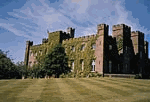 Located
1½ miles (2 km) N of Perth and 2 miles (3 km) W of New Scone, Scone
Palace is the family home of the Earls of Mansfield. Despite its historic
setting, the Palace we see today was only built in 1802 by English
architect William Atkinson, who went on to create Abbotsford for Sir
Walter Scott. Located
1½ miles (2 km) N of Perth and 2 miles (3 km) W of New Scone, Scone
Palace is the family home of the Earls of Mansfield. Despite its historic
setting, the Palace we see today was only built in 1802 by English
architect William Atkinson, who went on to create Abbotsford for Sir
Walter Scott.
Originally the site of a 6th C. Celtic church, replaced in the 12th C. by
an Augustinian Abbey and a Bishop's Palace which provided lodgings for the
Kings of Scotland. Both Palace and Abbey were destroyed in 1559 by a Perth
mob, incited by a sermon by John Knox (1505-72), and the lands passed to
the Earl of Gowrie, who built a new house. However, after the Gowrie
Conspiracy (1600), an attempt to kidnap James VI (1566-1625), the
estates were forfeit and given to Sir David Murray (1604), who was also
created Lord Scone, in return for his loyalty to James.
Murray built a new Palace in 1618 and it was here that Charles II
(1630-85) stayed before being the last King crowned on Moot Hill in the
palace grounds (1651), where Kings had been crowned since the time of
Kenneth MacAlpin (d.858). Other visitors included the Old Pretender (1715)
and his son Bonnie Prince Charlie (1745). Murray's descendants became the
Viscounts Stormont (1602) and then Earls of Mansfield (1776). The 1st Earl
spent his time in London and the 2nd Earl found the old palace too damp.
Thus it was David Murray, becoming the 3rd Earl at only 19, who
commissioned the rebuilding of the palace as the splendid castellated
gothic edifice in red sandstone which we see today. It houses fine
collections of furniture, paintings, ivory and porcelain, together with
historically-important royal heirlooms belonging to James VI and his
mother Mary.
The fine grounds include a fir tree planted in 1825 from seeds sent back
by botanist David Douglas (1799-1834), who had been a gardener at the
palace and ruins of the historic village of Scone, dismantled to permit a
larger estate around the new palace in 1805.
Information
kindly supplied by Scot Travel |

